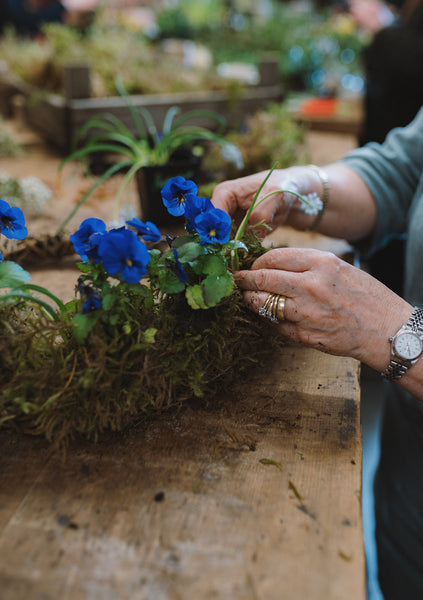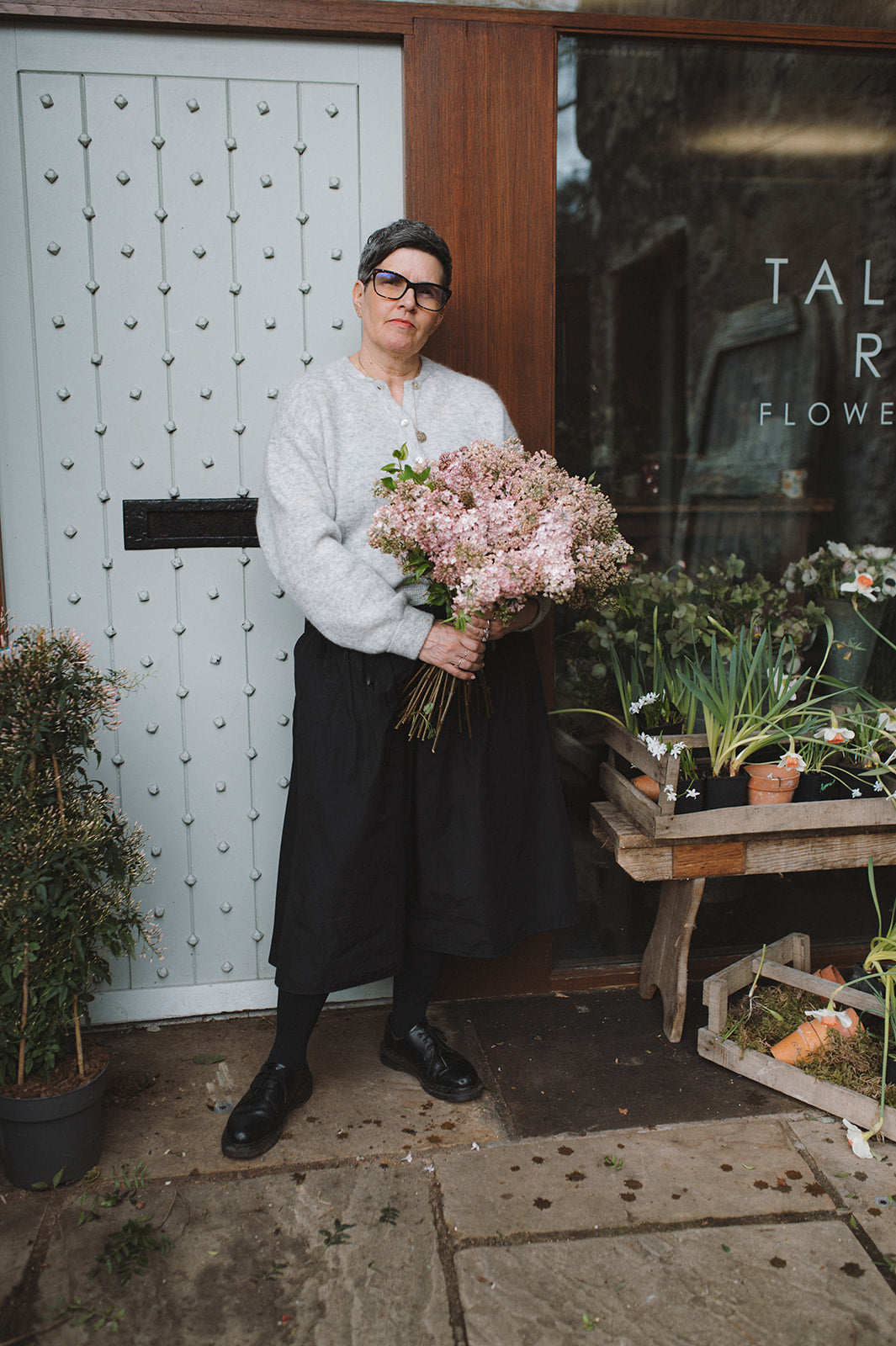1. Have you always lived in Cumbria?
Although I’ve visited Cumbria for holidays throughout my child and adult life I only moved here to live in 2019.
2. How long have you been working in floristry?
I made a career change into floristry from fashion buying in 2006. I was living in London at the time and completed the Jane Packer career change course. I had always enjoyed flowers, my mum and dad kept a very beautiful garden, and my mum often brought flowers into the house to arrange. After arranging my own wedding in 2004 I was bitten by the floristry bug and it quite literally grew from there!
3. What do you think are the essential qualities of a successful florist?
Stamina! When starting any new business I think stamina, grit if you like is vital. Floristry is a physically demanding job so strength is another quality to consider! Think buckets of water and heavy boxes of flowers…
On the flip side floristry is a remarkably creative career too. We’re fortunate to work with beautiful ingredients, so much colour, variety and texture.
Sustainability is an issue within our industry so as each new generation of florists enters into it it’s our responsibility to take care of our environment, locally and globally. Keep learning, keep an open mind and keep sharing. Share new ideas, new sustainable techniques with others within our industry so collectively we can and will make a difference.
4. How does the area of Cumbria and the landscapes inform your floristry seasonally?
From the very first day of flower school here in Cumbria I realised just how much the landscape would effect our students design and therefore the work they produce . Cumbria has big skies and big skies free our creative mind!
We’re fortunate to be based at Levens Hall so we’re surrounded by the most beautiful ancient trees, wild flowers, water and wonderful walls!
Because we’re surrounded by nature here at Levens but also into the Lake District too the seasons play a huge part in our designs. We’re fortunate to work with British flower growers for many months of the year… imagine the stunning autumnal back drop of the great Cumbrian outdoors highlighted with British grown dahlias here in flower school. That fact that we’re able to mirror the landscape with our flowers brings me, personally, a lot of joy!
5. How do you approach teaching floral design to students with different skill levels?
Generally our courses are based on a skill level, for example our career change courses assumes you know nothing about floristry. I often say to new students that if they bring a passion and love of flowers then I will bring everything else they need!
We run courses for florists already in business, for example we host sector specific courses, wedding and sympathy to mention two. In these classes we may have different skill levels. I ask each student at the start of the course what their expectations are and where they feel they need to most help. This helps me gauge the ability in the room and which student needs help in which area. A relaxed environment is vital too, if my students feel calm then they are more likely to ask for help. Enabling my student’s creativity to ‘swell’ will enable their confidence and therefore skill set to grow…
6. What do you think are the most important skills that florist students need to learn?
If we put the technical skills to one side for a moment (I’m offer heard saying that floristry is not difficult and that practise and experience will hone those skills pretty quickly!) I think business skills are the most important. Whether it’s costing and valuing your creativity or learning how social media can spread the word for your business these skills are vital to your success. Being open to learning from others, (in turn sharing too) doing something that makes you feel uncomfortable, a demonstration perhaps that shows a large group of enthusiasts exactly what you do. Practise ‘selling’ your business in a way that feels comfortable to you whether that’s your online voice or physical one!
Getting to grips with the finance of your business and bringing in experts to help when and where it’s necessary.
Passion can’t be learnt but I can honestly say it’s a skill that all my students arrive with!


7. What is your teaching philosophy when it comes to floral design?
For me it’s all about building confidence… in ability, in style and for those launching a career, in their business decisions too.
I provide a safe and relaxed environment for students to learn within. There is no judgement, no assessment only support and guidance. I allow students to select their own flowers, building their knowledge and confidence in their choices. While I demonstrate designs I would place an arrangement in front of my students and ask them to copy… each student needs to find their own way with their style of floristy and while most come to Tallulah Rose because we champion a more relaxed style and the use of British flowers we all like to place a unique stamp on our work!
Allowing each student the time he or she needs to discover their style, supporting them as they travel on their floristry path, however big or small. Continued support is vital too, most class students leave with a new group of friends and there support to each other takes over my role once they leave the classroom although our student forum keeps me in close contact with everyone…
8. What advice do you have for emerging florists?
Stay focussed on your end goal! If your business decisions aren’t taking you towards your goal, your vision for your business, then question why you’re doing it…
Surround yourself by others that are already doing what you’d like to be doing. Freelance for others and learn what they do. Network within the industry and related industries. Not be afraid to yes to a job even if it feels like a big step up. Keep learning, online in person, just keep learning.
Congratulate yourself every day, even on the difficult days! You made a decision to make a change and you’re doing it, you’re making it happen!
9. How do you encourage personal creativity and originality in your students?
I guess with social media we’re inspired by the creativity of others every day. Harnessing those ideas is a great place to start. Setting up ‘saved’ files on instagram for example means you’re able to pocket those ideas neatly into
Books, magazine, bookzines! I find so much inspiration in books, turning a physical page slows you down somehow, makes you really look.
Creating physical mood boards, something we do with our career change students. The process of tearing inspirational images from a magazine and placing them within a story board can be really powerful. Again it’s ‘off screen’ and way less distracting than if you were doing it digitally.
Visiting museums, galleries, cities and the high street stores have always offered me inspiration… the feel and touch of fabrics, the sights and sounds of ‘real life’ fuel my creative soul!
Talking with others, bouncing ideas around, listening too, really listening to what people have to say. If you do this well you’ll find out what people want and therefore what you can give.
10. What do you think the future of the floral industry, particularly from a sustainability perspective looks like, and how are you preparing your students for it?
Sustainability is a key issue within our industry, as is with many others too. It was highlighted a few years ago just how damaging to the environment, and ourselves, the use of floral foam was. We no longer teach with foam and many progressive florists no longer use it within there work however there is still a huge proportion of businesses and educators that do. Until floral foam is banned we will continue to educate and share as widely as possible the alternatives to using this toxic material.
We champion the use of locally grown flowers, whetever you are in the world if you’re able to use local, sustainably grown flowers then you’re doing the very best you can. We do recognise however that in order to work 12 months of the year on large scale events florists will need to import flowers too. We want to help florists make the best, informed decisions when buying from overseas growers. For this reason we’re taking time out from our usual course schedule during 2024 to take Tallulah Rose on the road. We’ll be visiting and teaching on the Netherlands, the USA and Japan. We’ll be focussing our efforts on learning from those overseas growers, seeing first hand their growing operations and sustainability policies. We’ll then bring our findings back to the Uk and share all that we’ve learnt, inturn allowing our florists to make informed decisions on who and where they buy their flowers from. 2024 promises to be an exciting, inspirational and no doubt challenging year for us but we can’t wait to learn and share!
We’ll be back in 2025 with our usual course schedule so if you’re planning to study with us this year please head to our website to book your place before we’re sold out and you have to wait until 2025!
Discover all about Rachel's Tallulah Rose Flower School here:
https://tallulahroseflowers.com/






